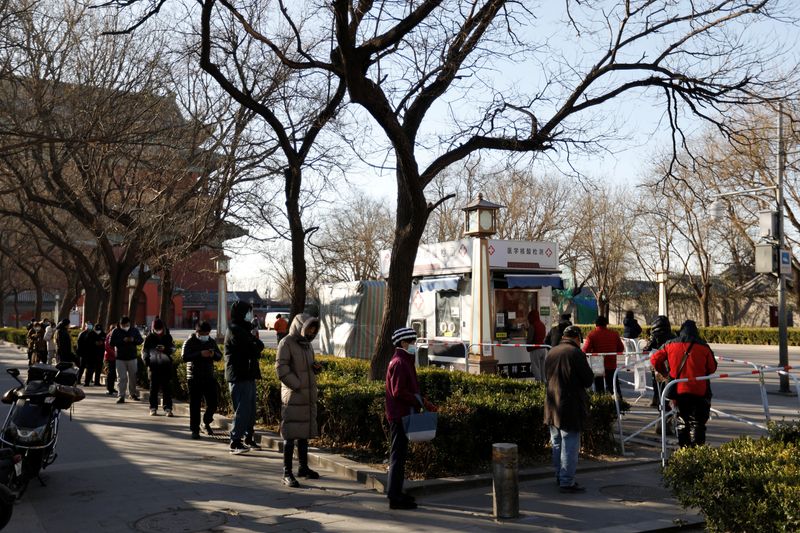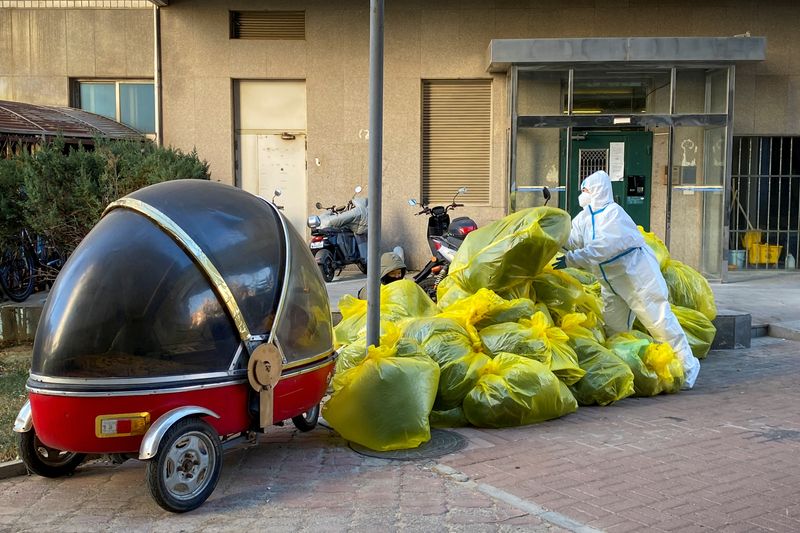By Ryan Woo and Martin Quin Pollard
BEIJING (Reuters) -Residents of China's capital were allowed into parks, supermarkets, offices and airports without a negative COVID-19 test on Tuesday, the latest in a mix of easing steps nationwide after unprecedented protests against a tough zero-COVID policy.
"Beijing readies itself for life again," read a headline in the government-owned China Daily newspaper, adding that people were "gradually embracing" newfound freedoms.
Authorities have been loosening some of the world's toughest COVID curbs to varying degrees and softening their tone on the threat of the virus, in what many hope could herald a more pronounced shift towards normalcy three years into the pandemic.
"This might be the first step towards reopening," Hu Dongxu, 27, told Reuters as he swiped his travel card to enter a train station in Beijing, which has also dropped the need for tests to use the subway.
As they waited for news, some people, wary the virus might now spread faster, rushed to buy COVID antigen kits and fever medicine and market regulators issued warnings against hoarding and hiking prices.
Both of the city's airports also no longer require people to test to enter the terminal, state media reported, although there was no indication of a change to the rule for a negative test before boarding a flight.
The loosening of the rules comes after a string of protests last month that marked the biggest show of public discontent in mainland China since President Xi Jinping took power in 2012.
While rallies have subsided, throngs of students at a university in Nanjing city chanted at a protest on Monday against COVID policy on their campus, according to videos on Twitter. Reuters confirmed that the footage was taken at Nanjing Tech University.
China may announce 10 new easing measures as early as Wednesday, two sources with knowledge of the matter told Reuters.
The prospect of a relaxation has sparked optimism among investors that the world's second biggest economy would regather strength and help to boost global growth.
The Chinese yuan has risen about 5% against the dollar since early November on expectation of an eventual reopening of China's economy.
Screenshots of an article criticising China's the zero- COVID policy published by a health supervision body in Henan province were widely shared on social media on Tuesday, after it was censored following its publication.
The article posted on the WeChat page of the Zhumadian city health commission, criticised some "devastating" impacts caused by the policy and its sometimes "brutal" implementation.
But on the ground, many people have been slow to adapt to the changing rules. Commuter traffic in major cities such as Beijing and Chongqing has remained a fraction of normal levels.
Some people remain wary of catching the virus, especially the elderly, while there is concern about the strain the loosening may put on a fragile health system.
"My parents are still very cautious," said James Liu, 22, a student in Shenzhen city in the southern province of Guangdong, where authorities dropped testing requirements to get into the family's residential compound.
China has reported 5,235 COVID-related deaths as of Monday, but some experts have warned that toll could rise above 1 million if the exit is too hasty.
NEXT PHASE
Analysts at Nomura estimate that areas under lockdown represent about 19.3% of China's total gross domestic product, equivalent to the size of India's economy but down from 25.1% last Monday.
This marks the first decline in Nomura's closely watched China lockdown index since early October.
Meanwhile, officials continue to play down the dangers posed by the virus, bringing China closer to what other countries have been saying for more than a year as they dropped restrictions and opted to live with the virus, even as it spread.
China's management of the disease may be downgraded as soon as January, to the less strict Category B from the current top-level Category A of infectious disease, Reuters reported on Monday.
"The most difficult period has passed," the official Xinhua news agency said in a commentary on Monday, citing the weakening pathogenicity of the virus and efforts to vaccinate 90% of the population.
Analysts predict China may reopen the economy and drop border controls sooner than expected next year, with some seeing it fully open in spring.
But more than half of Chinese say they will put off travel abroad even if borders reopen now, according to a survey of 4,000 consumers by consultancy Oliver Wyman.
But for all those wary of returning to normality, there are others clamouring for more freedoms.

"Let's implement these policies quickly," a Beijing-based lawyer surnamed Li wrote on WeChat, reacting to the dropping of testing requirements.
"Our lives and work have been affected for so long."
